The LA Times once called Zayra, “An aspiring rock goddess, who prances around in cosmic blue cat suits like she’s Ziggy Stardust’s long lost Caribbean cousin.” Here, she gets her Kill Bill on, with a trailer-park battle. I look forward to the feature-length version. :-)
Month: December 2010
Ichi
★★★
“Ichi the not-quite so much a killer as we hoped.”
 This unofficial spin-off from the Zatoichi series had us wondering if there’s a Japanese studio version of The Asylum out there – the people who specialize in knockoffs of popular films, including such classics as Snakes on a Train and Sunday School Musical. We’ll cut the makers of this some slack, since we’re of the opinion that all action films are improved with a heroine in the lead. That’s the main switch here: Zatoichi becomes Ichi (Ayase), a blind swordswoman and entertainer, who is roaming the country in search of the man she believes is her father. She is quite capable of taking care of herself, but the resulting trail of bodies is blamed on travelling companion Tomo Fujihira (Ôsawa), who becomes bodyguard to a town under assault from a gang, led by Banki (Nakamura). Unfortunately, since he accidentally blinded his mother, Tomo is unable to pull his sword from its scabbard, and the Banki gang are ready to wreak revenge on him for the members killed by Ichi.
This unofficial spin-off from the Zatoichi series had us wondering if there’s a Japanese studio version of The Asylum out there – the people who specialize in knockoffs of popular films, including such classics as Snakes on a Train and Sunday School Musical. We’ll cut the makers of this some slack, since we’re of the opinion that all action films are improved with a heroine in the lead. That’s the main switch here: Zatoichi becomes Ichi (Ayase), a blind swordswoman and entertainer, who is roaming the country in search of the man she believes is her father. She is quite capable of taking care of herself, but the resulting trail of bodies is blamed on travelling companion Tomo Fujihira (Ôsawa), who becomes bodyguard to a town under assault from a gang, led by Banki (Nakamura). Unfortunately, since he accidentally blinded his mother, Tomo is unable to pull his sword from its scabbard, and the Banki gang are ready to wreak revenge on him for the members killed by Ichi.
The main problem is that Tomo is the focus of the film more than Ichi. This is somewhat understandable, since Ichi takes “stoic silence” to much the same level as the corpses she leaves behind. We get some fragmentary glimpses of her past, and what makes her the way she is, but as far as her current personality goes, she’s never going to be accused of talking too much. Or at all. Making matters worse, during much of the climactic final battle between the Bankis and the townsfolk, Ichi is nowhere to be found. We’d been hoping for something like the climax of Azumi, with her slicing and dicing her way through a host of bad guys. Ichi had showed a nice economy of effort early on, maintaining a close to 1:1 ratio of slashes to kills (and never having as much as a hair out of place), but it turns out Banki has dealt with her style before, hampering its effectiveness.
On the plus side, it’s very-nicely shot, and as sidekicks go, Tomo is an amiable character, sliding from comic interest to love interest to tortured-hero interest with ease. This is as much a case of managing expectations as anything. It’s a solid samurai drama, and if it had been called Tomo, we would likely have been less disappointed in the way the film concentrates on him. Admittedly, if that had been the case, we probably wouldn’t have bothered getting a copy…
Dir: Fumihiko Sori
Star: Takao Ôsawa, Haruka Ayase, Shido Nakamura, Yosuke Kubozuka
Resident Evil: Afterlife
Resident Evil: Afterlife
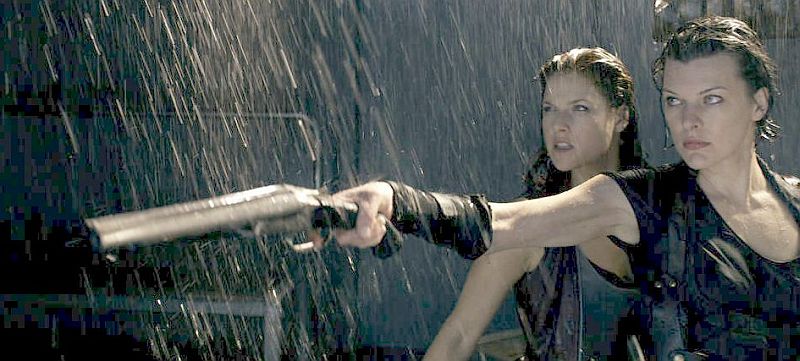
★★★
“Is There Life After Afterlife?”
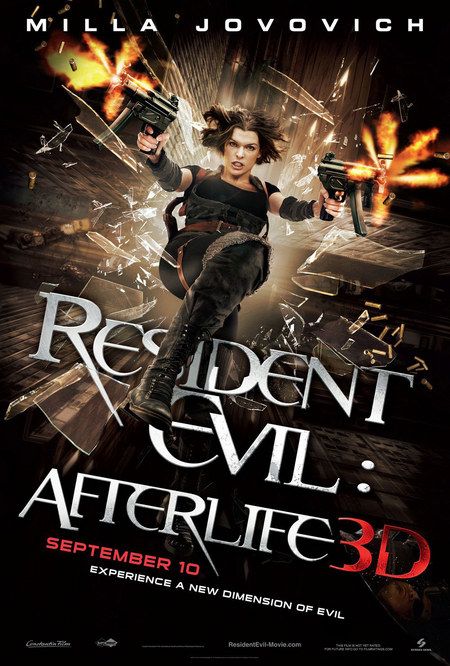 Milla Jovovich, coming at you in three dimensions! Unfortunately, Chris and 3D movies do not play well with each other – as we discovered at Avatar, where the resulting motion sickness had her staring at the back of the seat in front, after the first twenty minutes. She understandably declined all invitations to see Afterlife in this mode, so please note that with regard to this review, we’re strictly discussing the 2-D version. Other reports generally indicate the 3-D is pretty spiffy, having actually been shot that way, rather than being some hacked conversion job like certain movies I could mention [cough-ClashoftheTitans-cough]. That said, we move on.
Milla Jovovich, coming at you in three dimensions! Unfortunately, Chris and 3D movies do not play well with each other – as we discovered at Avatar, where the resulting motion sickness had her staring at the back of the seat in front, after the first twenty minutes. She understandably declined all invitations to see Afterlife in this mode, so please note that with regard to this review, we’re strictly discussing the 2-D version. Other reports generally indicate the 3-D is pretty spiffy, having actually been shot that way, rather than being some hacked conversion job like certain movies I could mention [cough-ClashoftheTitans-cough]. That said, we move on.
We keep bumping into the first Resident Evil movie, which has been on cable a lot lately, and I’m tending to think my 3 1/2-star review was an under-estimate. Maybe due to the underwhelming nature of the last couple of entries in the series, the original moves briskly, keeps a tight focus on proceedings, and has a nice character arc for Alice. I was hoping that the return of its creator, Paul W.S. Anderson, to writing and directing for this fourth installment would signal a return to this approach.
There’s really only one reason we bother with this series: to see Milla Jovovich kicking righteous ass. Everything else is – or should be – secondary. And for the first 15 minutes, it looked like this would indeed be a return to these basics, as Alice and an army of Alice-clones launched a righteous assault on the massive complex housing the Umbrella Corporation’s headquarters beneath Tokyo. It’s reminiscent of the lobby scene from The Matrix, with a swarm of Alice-alikes breaking in and hurling themselves against the guards like aggrieved lemmings, with no regard for their personal safety, as they try to take out Umbrella’s CEO’s Albert Wesker (Roberts).
It’s great: among the best scenes of the entire series, in fact. The bad news is, it’s also the best thing in the movie. The sequence would have made a great climax, but instead, everything thereafter feels like an anti-climax. Wesker escapes by helicopter, flipping the self-destruct switch and destroying the clones. However, the real Alice is aboard, and before the ‘copter crashes, he injects her with a serum that neutralizes the T-virus, rendering her human again. Boooooo-ring! Turns out they both survive the crash: quite why Wesker didn’t deal with her then, isn’t made clear. Alice heads to Alaska, in search of the haven called Arcadia where Claire Redfield (Larter) was heading at the end of the third film.
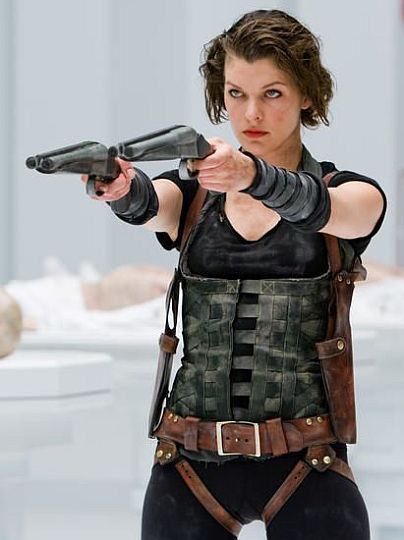 That turns out to be a red herring, but Alice does find Claire, albeit now controlled by an Umbrella device on her chest. Removing that, albeit at the cost of Claire’s memory, the pair fly back down the West coast, eventually locating a group of survivors bunkered down in an LA prison – Arcadia turns out to be the name of a boat, anchored just offshore. As the zombies break in, the survivors make their way towards the boat, with the help of a prisoner who turns out to be Chris (Miller), Claire’s brother. Reaching the Arcadia, they discover it’s a trap, designed to lure people to it for Umbrella’s research, with Wesker overseeing operations. He wants to assimilate (or “eat”) Alice; as the only person to successfully meld with the T-virus, he wants that ability to enhance his own superpowers.
That turns out to be a red herring, but Alice does find Claire, albeit now controlled by an Umbrella device on her chest. Removing that, albeit at the cost of Claire’s memory, the pair fly back down the West coast, eventually locating a group of survivors bunkered down in an LA prison – Arcadia turns out to be the name of a boat, anchored just offshore. As the zombies break in, the survivors make their way towards the boat, with the help of a prisoner who turns out to be Chris (Miller), Claire’s brother. Reaching the Arcadia, they discover it’s a trap, designed to lure people to it for Umbrella’s research, with Wesker overseeing operations. He wants to assimilate (or “eat”) Alice; as the only person to successfully meld with the T-virus, he wants that ability to enhance his own superpowers.
There’s way too much moving about in underground darkness here, and elements are lobbed in from the video game, which make no sense in the context of the movie. For instance, some zombies now have their faces split open and become all tenticular: why, is never explained, and the CGI used here is less effective than the effects used for a similar concept in Blade II, almost a decade ago. There’s also the Executioner, a giant creature wielding an even-larger weapon: again, its presence from a cinematic perspective is completely unexplained. In short, the film just doesn’t make much sense, though admittedly, between the battles, there was precious little of interest going on to hold my attention.
Nor is there much feeling of threat to the characters, who cheat death with blithe abandon – the sense of “anyone can die, at any time” present in the original is all but gone. A case in point would be the leader of the survivors, who vanished from the film entirely as they make their way out of the prison, only to reappear, right at the end, to no point whatsoever. Chris Redfield is an almost entirely superfluous character; like the monsters mentioned above, he is apparently there, just so that fans of the game can go “Look! It’s Chris Redfield!” The rest of us…not so much. The whole subplot of Alice’s humanity being restored doesn’t go anywhere either; that may well be fortunate. In any case, by the end, she seems completely back to normal. Well, “normal” in the way we want to see, anyway.
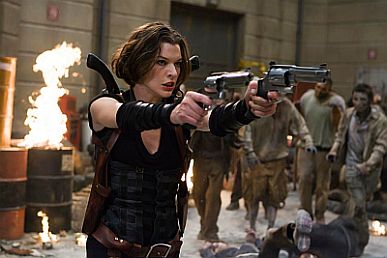 Which brings me nicely to the action, and it is, as usual for the series, solid, meaning this is, overall, just worth the 92 minutes of your time it will take up. I think due to the 3-D, the editing is more restrained than it has been of late; indeed, there’s probably as much slow-motion as anything else. I particularly liked Alice’s fondness for loading her shotgun with coins – again, I suspect largely for 3-D purposes. There’s a nice tag-match between her, Claire and the Executioner, but the final face-off versus Wesker is largely forgettable. As usual, the film ends on an interesting note: this time, it’s the return of a character last seen in Apocalypse, who makes a cameo early in the end-credits, and I wouldn’t mind seeing them return.
Which brings me nicely to the action, and it is, as usual for the series, solid, meaning this is, overall, just worth the 92 minutes of your time it will take up. I think due to the 3-D, the editing is more restrained than it has been of late; indeed, there’s probably as much slow-motion as anything else. I particularly liked Alice’s fondness for loading her shotgun with coins – again, I suspect largely for 3-D purposes. There’s a nice tag-match between her, Claire and the Executioner, but the final face-off versus Wesker is largely forgettable. As usual, the film ends on an interesting note: this time, it’s the return of a character last seen in Apocalypse, who makes a cameo early in the end-credits, and I wouldn’t mind seeing them return.
Despite the 3-D, the movie was only a mediocre success here, but a much greater hit overseas. For perspective, the percentage of total box-office coming outside North America for the first three entries was fairly constant, at 61%, 60% and 66% respectively. Afterlife got an astonishing 80% of its takings in foreign territories, grossing $236 million there, compared to only $60m in the US, barely recovering its budget. That’s one of the highest ratios of the year, and has only been surpassed a handful of times this decade, by films with a broad Stateside release. It’s this success abroad which means a fifth installment is all but certain. And as long as they keep making them, we’ll keep watching, hoping the potential, seen in flashes, might be more fully realized. A script which makes sense on its own terms, and doesn’t bother pandering to gamers, would be a good start.
Dir: Paul W.S. Anderson
Stars: Milla Jovovich, Ali Larter, Wentworth Miller, Shawn Roberts
Reign of Assassins
★½
“I liked it much better it the first time, when it was called Mr. and Mrs. Smith.”
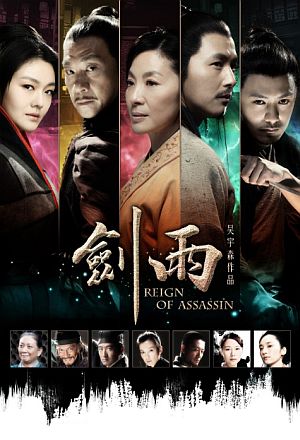 The most disappointing film of 2010? I went in with huge expectations, based on reviews that said, “The best swordplay film since Crouching Tiger, Hidden Dragon..” O RLY? I know Crouching Tiger. Crouching Tiger is one of my favourite movies. And Reign of Assassins, you’re no Crouching Tiger. It’s a confused, poorly-shot mess that proved a struggle to endure and a challenge to stay awake, right from the opening lump of introduction. Stick with me for this synopsis. The remains of a Buddhist monk, split in two, are said to turn whoever has them into a kung-fu master. The Dark Stone gang, under the Wheel King (Wang), want to possess them, and get one half, but gang member Drizzle makes off with the body parts, undergoes plastic surgery that turns her into Michelle Yeoh and takes up a quiet life as a fabric seller. She meets and marries Jiang Asheng (Jung), until her secret identity is revealed in a bank raid, and the Dark Stone gang come after her again. However, turns out Jiang isn’t who he seems either…
The most disappointing film of 2010? I went in with huge expectations, based on reviews that said, “The best swordplay film since Crouching Tiger, Hidden Dragon..” O RLY? I know Crouching Tiger. Crouching Tiger is one of my favourite movies. And Reign of Assassins, you’re no Crouching Tiger. It’s a confused, poorly-shot mess that proved a struggle to endure and a challenge to stay awake, right from the opening lump of introduction. Stick with me for this synopsis. The remains of a Buddhist monk, split in two, are said to turn whoever has them into a kung-fu master. The Dark Stone gang, under the Wheel King (Wang), want to possess them, and get one half, but gang member Drizzle makes off with the body parts, undergoes plastic surgery that turns her into Michelle Yeoh and takes up a quiet life as a fabric seller. She meets and marries Jiang Asheng (Jung), until her secret identity is revealed in a bank raid, and the Dark Stone gang come after her again. However, turns out Jiang isn’t who he seems either…
While obviously, some suspension of disbelief is necessary when watching wuxia films, we’re expected to believe they had plastic surgery? And I thought it was supposed to take years off, not turn Kelly Lin (aged 34) into Yeoh (47). That kind of problem cripples the entire film, as does the leaden romance, with none of the passion seen in Tiger: instead, if we get Jiang offering to help close Drizzle’s stall when it rains once, we get it half a dozen times. Is she too dumb to get a damn canopy? Such thoughts interrupt your train of thought far too often, and as a result it fails to engage, with the bad guys a selection of one-dimensional stereotypes, such as Turquoise (Hsu), Drizzle’s replacement, who drops her clothes at the drop of…er, a cloth. Though her over-acting is at least fun to watch; we simply wanted the Wheel King to get some cough lozenges, his raspy voice being the most irritating since Christian Bale in The Dark Knight.
Much of this could be forgiven if the action was coherently put together, but it isn’t. Ang Lee was wise enough to step back, leave the camera rolling and let Yeoh and Zhang ZiYi do their thing. Neither director here exactly has a pedigree in the swordplay genre – and boy, does it show. Filmed with too many close-ups – it felt pan-and-scanned even though it wasn’t – and edited in such a choppy fashion, you have little clue what’s happening or who’s doing the fighting. Sitting through tedious relationship stuff, only to find the battles largely an incoherent mess, including mediocre CGI, was the final straw. Our interest, already flickering, was finally snuffed out.
Dir: Chao-Bin Su and John Woo
Star: Michelle Yeoh, Woo-sung Jung, Xueqi Wang, Barbie Hsu
Double Dare
★★★★½
“Zoë Bell, you’re our heroine. Never change.”
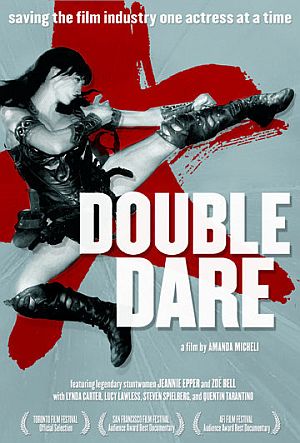
 The day after watching this documentary, I was clearing out the shed in preparation for our house move. I twisted my back, and thought about giving up, but soldiered on until the job was done – because that’s what Zoë Bell would do. It’s now my life philosophy: WWZD? She’s the main focus here, from working as Lucy Lawless’s double on Xena in New Zealand, through an unsuccessful attempt to break in to Hollywood, and on to a second try, where she’s hired to stand-in for Uma Thurman in Kill Bill. Paralleling this, it looks at Jeannie Epper, a veteran stuntwoman who shadowed Lynda Carter in Wonder Woman. Now nearing her 60th birthday, Epper is still active and seeking work, fighting against the problems of being a female in an extremely male-dominated industry.
The day after watching this documentary, I was clearing out the shed in preparation for our house move. I twisted my back, and thought about giving up, but soldiered on until the job was done – because that’s what Zoë Bell would do. It’s now my life philosophy: WWZD? She’s the main focus here, from working as Lucy Lawless’s double on Xena in New Zealand, through an unsuccessful attempt to break in to Hollywood, and on to a second try, where she’s hired to stand-in for Uma Thurman in Kill Bill. Paralleling this, it looks at Jeannie Epper, a veteran stuntwoman who shadowed Lynda Carter in Wonder Woman. Now nearing her 60th birthday, Epper is still active and seeking work, fighting against the problems of being a female in an extremely male-dominated industry.
The thing that comes over is how delightfully un-Hollywood Bell is, innocent almost to the point of naivety – she’s blissfully unaware of the need, for example, to have head shots, and drops F-bombs with a marvellously casual air. The cameras are rolling when she gets the call telling her she’s got the Kill Bill job, and her obvious, genuine delight at the news, brought a huge grin to our faces, and is completely endearing. It’s to be hoped that Hollywood doesn’t change her in the slightest, and Zoë remains the same, down-to-earth, well-grounded person shown here, who is now even more solidly entrenched among our favourite contemporary action heroines.
I have some concerns there, based on Epper; her contemplation of plastic surgery and liposuction at her age is more sad than anything else, as is watching Jeannie working the phones, basically begging for work, even though she’s a legend in the business. There’s a good heart beating in there (Epper donated a kidney to a friend, for instance), but she has clearly been ground down by her decades in the film industry, and become a lot more cynical and battle-weary as a result. That’s no wonder, when you witness her struggles trying to get equal treatment for women at the annual awards ceremony. It’s a somewhat grim reality-check, warning of the potential perils ahead for Bell in her career.
But aside from the contrast in the two heroines, this is a fascinating study in a side of the business that doesn’t get anything like the recognition it deserves. As one comment I read elsewhere said, “If you liked Uma Thurman in Kill Bill, Zoë Bell is the reason why,” and that sums up the shadows in which stuntwomen work. This film shines a light into that darkness, and both Epper and Bell deserve enormous respect and admiration for putting their bodies on the line, in the name of our entertainment. And while I’m not really a big Tarantino fan, if he turns out to be responsible for bringing Bell to a wider audience, then it’s perhaps the biggest gift his career will have given us.
Dir: Amanda Micheli
Star: Jeannie Epper, Zoë Bell
Les Femmes de l’ombre
★★★★
“Wartime derring-do with the Inglourious Bastardettes.”
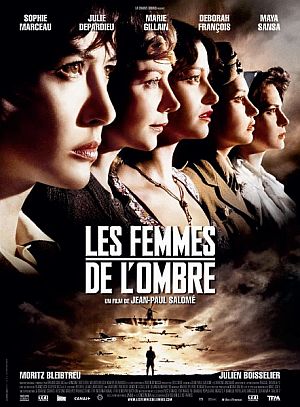
 It’s May 1944, and the imminent D-day landings by the Allies in France are imperiled, when a geologist, sent to check one of the beaches, is injured and ends up in hospital. A team of five Frenchwomen, from various backgrounds and led by Louise (Marceau), a trained sniper whose husband was recently killed by Ze Germans, is sent in to occupied territory to rescue the geologist before he is found by Colonel Heindrich (Bleibtreu), and forced to give up the location of the invasion, allowing the Germans to meet it head-on. However, that turns out to be just the start of their dangerous mission.
It’s May 1944, and the imminent D-day landings by the Allies in France are imperiled, when a geologist, sent to check one of the beaches, is injured and ends up in hospital. A team of five Frenchwomen, from various backgrounds and led by Louise (Marceau), a trained sniper whose husband was recently killed by Ze Germans, is sent in to occupied territory to rescue the geologist before he is found by Colonel Heindrich (Bleibtreu), and forced to give up the location of the invasion, allowing the Germans to meet it head-on. However, that turns out to be just the start of their dangerous mission.
First off, the French title, which translates as “Women of the shadow”, is a good deal more evocative than the bland “Female Agents” one, and conveys much better the…well, shadowy nature of the enterprise. It feels somewhat of a cross between The Dirty Dozen and Inglourious Basterds, with the team cobbled together from irregular forces, such as Jeanne (Depardieu, Gerard’s daughter), a prostitute who faced the hangman’s noose for murdering her pimp, or Suzy (Gillain), who used to be Heindrich’s mistress. This could have led to caricature – the whore, the smart one, the devout Catholic – yet the film, largely avoids this. Even Heindrich is not a stereotypical Nazi, another aspect that reminded us of Basterds, though the Allied force here is far less brutal.
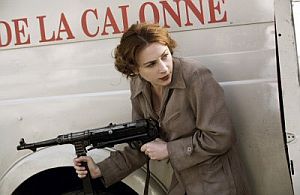 It’s a solid piece of action/drama, which managed to keep both of us awake, despite a session earlier in the evening at the “all you can eat” fish fry; normally, that requires 30,000 Volts to keep us from sliding into post-gluttony unconsciousness. I think Chris enjoyed the movie a little more: I was somewhat on the fence about giving it the seal, finding some of the plotting a little convoluted and occasionally implausible, but her endorsement of this as “great” provided sufficient impetus. Marceau is particularly good, exuding steely resolve to hold the team together, and Bleibtreu makes an excellent foil, coming across as equally smart and committed as Louise. Their conflict is the glue that binds the story together, and makes it one of the best efforts in the wartime heroine genre to date.
It’s a solid piece of action/drama, which managed to keep both of us awake, despite a session earlier in the evening at the “all you can eat” fish fry; normally, that requires 30,000 Volts to keep us from sliding into post-gluttony unconsciousness. I think Chris enjoyed the movie a little more: I was somewhat on the fence about giving it the seal, finding some of the plotting a little convoluted and occasionally implausible, but her endorsement of this as “great” provided sufficient impetus. Marceau is particularly good, exuding steely resolve to hold the team together, and Bleibtreu makes an excellent foil, coming across as equally smart and committed as Louise. Their conflict is the glue that binds the story together, and makes it one of the best efforts in the wartime heroine genre to date.
[Note: The film is loosely – very loosely – based on Lisé de Baissac, who did operate undercover in France during the second-half of the war. However, there’s little or no evidence of any mission that parallels the one depicted in the film. In the time leading up to D-day, she was doing reconnaissance work in Normandy, scouting out holding grounds for airborne troops.]
Dir: Jean-Paul Salomé
Star: Sophie Marceau, Julie Depardieu, Marie Gillain, Moritz Bleibtreu
a.k.a. Female Agents
Hora (The Whore)
★★
“Grindhouse, Norwegian style.”
 Crime-writer Rikke (Vibe) heads out to her former home in the country for a quiet few days catching up on her work. There she bumps into a guy whom she hasn’t seen since she was eight, but who still seems to have the hots for her. She declines his advances, telling him of her husband back in the city, but he persists in his efforts, along with his policeman friend, and the backward clerk in a local convenience-store. A dead animal is left on her doorstep, and that’s only a precursor to a long, brutal assault on Rikke that leaves her battered and bruised, almost beyond recognition. However, barely have the rapists left, before she is already planning her revenge on each one of them, and it will be every bit as unpleasant.
Crime-writer Rikke (Vibe) heads out to her former home in the country for a quiet few days catching up on her work. There she bumps into a guy whom she hasn’t seen since she was eight, but who still seems to have the hots for her. She declines his advances, telling him of her husband back in the city, but he persists in his efforts, along with his policeman friend, and the backward clerk in a local convenience-store. A dead animal is left on her doorstep, and that’s only a precursor to a long, brutal assault on Rikke that leaves her battered and bruised, almost beyond recognition. However, barely have the rapists left, before she is already planning her revenge on each one of them, and it will be every bit as unpleasant.
Yes, it’s basically I Spit on Your Grave with a Scandinavian accent, and I’m not sure this is quite what the world needs. While I’ve no problem per se with rape-revenge movies, I am far more interested in the revenge part of the equation. See, for instance, Ms. 45, which gets to that side of things inside about 15 minutes, and is all the better for it. Here, once you get past the opening scene, the first 45 minutes are largely Rikke lounging around the cabin in her dressing-gown. She pecks away on the computer, occasionally chats to her husband (who seems more than a bit of a jerk, especially when drunk), and has uncomfortable interactions with her admirers. Then there’s the attack itself, which is vicious and unpleasant – exactly how cinematic rape should be, of course, but this doesn’t make it any more pleasant to watch, especially at the length depicted here.
Finally, we get to the revenge, and it’s pretty much as you’d expect. Indeed, the entire thing is more or less what you would imagine from the synopsis, and that’s perhaps the main issue. There’s only a couple of moments where Kiil shows flair and while Vibe (a stripper and porn star) is decent enough in the role, you don’t get much sense of Rikke’s character or personality. That’s where the impact – both from the rape, and the subsequent revenge – originates, and as a result, this left me feeling a bit like a poorly-made martini, neither shaken nor stirred.
Dir: Reinert Kiil
Star: Isabel Vibe, Jørgen Langhelle, Kenneth Falkenberg, Gaute Næsheim
The Apocalypse Code
★★★½
“Proof that cheerily mindless action pics are not the exclusive domain of Hollywood.”
 About ten minutes into this, as another large explosion filled the screen, Chris turned to me and said, “Is this a Michael Bay movie?” While it isn’t, confusion is understandable: this is just the kind of dumb action film for which he is renowned, featuring basic plotting and large-scale mayhem. Terrorist Jaffad is just about to sell four nuclear warheads he has hidden in major cities worldwide back to the Americans, when his entire compound is taken out, at the command of a mysterious figure known as “The Butcher.” FSB Agent Marie (Zavorotnyuk), who had previously been working undercover to get to Jaffad, just manages to escape the slaughter, and is now assigned to track down the Butcher, by getting close to his financial advisor, Louis (Perez). Jaffad gave parts of the eleven-digit code that can be used to detonate the devices, to trusted colleagues in Italy, Norway and Malaysia, and Marie needs to find the code before the Butcher.
About ten minutes into this, as another large explosion filled the screen, Chris turned to me and said, “Is this a Michael Bay movie?” While it isn’t, confusion is understandable: this is just the kind of dumb action film for which he is renowned, featuring basic plotting and large-scale mayhem. Terrorist Jaffad is just about to sell four nuclear warheads he has hidden in major cities worldwide back to the Americans, when his entire compound is taken out, at the command of a mysterious figure known as “The Butcher.” FSB Agent Marie (Zavorotnyuk), who had previously been working undercover to get to Jaffad, just manages to escape the slaughter, and is now assigned to track down the Butcher, by getting close to his financial advisor, Louis (Perez). Jaffad gave parts of the eleven-digit code that can be used to detonate the devices, to trusted colleagues in Italy, Norway and Malaysia, and Marie needs to find the code before the Butcher.
Expensive by Russian standards, yet relatively cheap ($13.5m budget) by American ones, this certainly provides bang for its buck, whizzing around the globe like the Bond movie it mostly wants to be, while putting its heroine in a selection of glamorous costumes and wigs (prefer blondes? Marie can provide for you too, as shown in the pic at lower-right). Shmelev has a good visual eye for proceedings, shooting and framing the action with some beautiful work, and makes the most of his locations. Zavorotnyuk has good screen presence, and I liked that no-one made much mention of her sex; she’s just another agent. It gets bonus points simply through its origins, which confer a different approach – when the Americans show up (though it’s difficult to tell, since everyone speaks Russian), they aren’t particularly good or bad, just there.
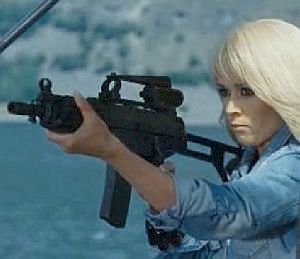 However, the plot is not novel at all, the efforts to give Marie backstory are near-laughable, and once the novelty of the Russian heroes wears off, the script has little to offer: significant fragments don’t make much sense, and other scenes seem to be there, just to prove the makers actually went to the locations. Action-wise, it’s somewhat of a mixed bag; it seems pretty clear the lead actress isn’t doing much of the action herself, but there’s a nice fight at the end between Marie and the villain, in front of the console which can be used to detonate the bombs, as a self-destruct timer counts down. You can also enjoy a gun-battle on a boat, and Marie stocking the corridors of a hotel [you’ll understand why I spelled it like that, hohoho].
However, the plot is not novel at all, the efforts to give Marie backstory are near-laughable, and once the novelty of the Russian heroes wears off, the script has little to offer: significant fragments don’t make much sense, and other scenes seem to be there, just to prove the makers actually went to the locations. Action-wise, it’s somewhat of a mixed bag; it seems pretty clear the lead actress isn’t doing much of the action herself, but there’s a nice fight at the end between Marie and the villain, in front of the console which can be used to detonate the bombs, as a self-destruct timer counts down. You can also enjoy a gun-battle on a boat, and Marie stocking the corridors of a hotel [you’ll understand why I spelled it like that, hohoho].
It originally came out in Russia more than three years ago, and I’m a little surprised the film apparently hasn’t had any kind of official release in the UK or US. It’s glossy, well-produced nonsense, that completely fails to engage the brain or heart, yet kept me adequately interested for 105 minutes, with plenty of eye-candy [note to Chris: I mean the exotic locations, darling…] and giant fireballs. While I’ve already forgotten much of what happened in this, it is as good a stab at creating a female Jason Bourne as anything Hollywood has yet managed.
Dir: Vadim Shmelev
Star: Anastasiya Zavorotnyuk, Vincent Perez, Vladimir Menshov, Oskar Kuchera
Mutant Girls Squad
★★★★
“X-Men, as directed by Peter Jackson. And not LotR Peter Jackson. Brain Dead Peter Jackson.”

 It makes sense that this stems from a drunken agreement between the three co-directors at a film festival, because this is the sort of film you would only make under inebriated terms, and it’s probably true to say that drunk is the best way to watch this. That’s not a bad thing per se, just that its loopy sensibilities and over-the-top antics would seem to go particularly well with a few beers. Rin (Sugimoto) hits her sixteenth birthday not too happy, being bullied at school. However, the bullies have a surprise in store, as it turns out Rin is half-human, half-Hiiko, with her father being from a mutant race with extraordinary powers. They have largely been hiding from humanity, but are now fed up of being persecuted, and under the leadership of Kisaragi (Sakaguch), are about to declare total war on us. Rin, along with Yoshie (Morita) and Rei (Takayama), are to lead the strikeforce, though Rin is less convinced over the need to target all of mankind.
It makes sense that this stems from a drunken agreement between the three co-directors at a film festival, because this is the sort of film you would only make under inebriated terms, and it’s probably true to say that drunk is the best way to watch this. That’s not a bad thing per se, just that its loopy sensibilities and over-the-top antics would seem to go particularly well with a few beers. Rin (Sugimoto) hits her sixteenth birthday not too happy, being bullied at school. However, the bullies have a surprise in store, as it turns out Rin is half-human, half-Hiiko, with her father being from a mutant race with extraordinary powers. They have largely been hiding from humanity, but are now fed up of being persecuted, and under the leadership of Kisaragi (Sakaguch), are about to declare total war on us. Rin, along with Yoshie (Morita) and Rei (Takayama), are to lead the strikeforce, though Rin is less convinced over the need to target all of mankind.
This is right up there with Brain Dead in terms of the goriest movie ever, with fountains of blood, real and digital painting the entire screen, including the lens, though rarely affecting our heroine’s sailor-suit school uniform. Which, one assumes, is part of the joke, for everything about this is so amazingly excessive, it’s impossible to take any of it seriously, even as it is played completely straight-faced. The talents, for instance, include a waitress whose breasts each sprout a sword and a cheerleader, concealing a chainsaw in a place power-tools are not normally located. No explanation for any of this is ever given. It just is, and you either buy into it or you don’t. Yet there’s also a moment or two of poignancy, as Rin struggles to decide whether to align herself with a human race which has largely rejected her, or her new “family,” weird and incredibly ultraviolent as they may be.
While the gore is certainly present in buckets, as we’ve seen, that isn’t enough by itself to make for entertainment, and the insane imagination on view here is equally impressive. This is particularly true at the end, when Kisaragi reveals his final form. Let’s just say, breasts that squirt acid milk is one of the lesser of his talents. This kind of lunatic invention makes the film work, and while you undeniably need a large tolerance for arterial spray, and some of the FX are rubbery, to say the least, it is thoroughly fun schlock, unlike anything produced by even the most warped Western company.
Dir: Noboru Iguchi, Yoshihiro Nishimura, and Tak Sakaguchi
Star: Yumi Sugimoto, Suzuka Morita, Yuko Takayama, Tak Sakaguchi






















